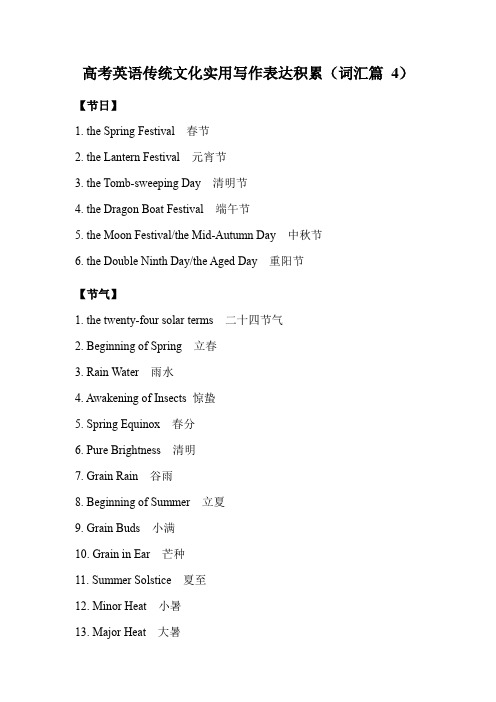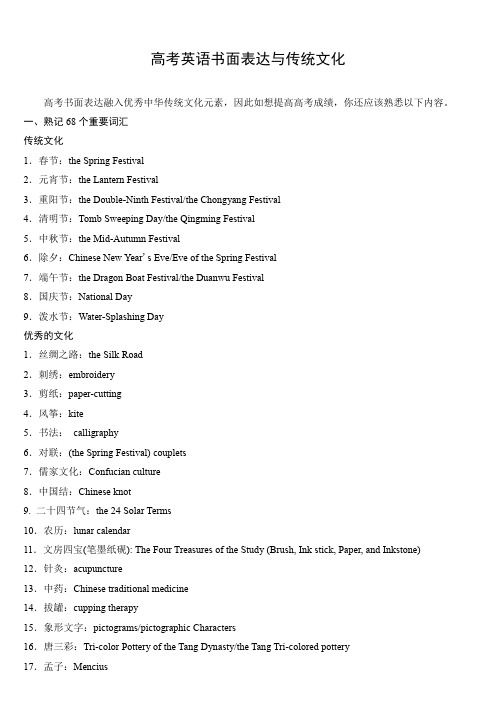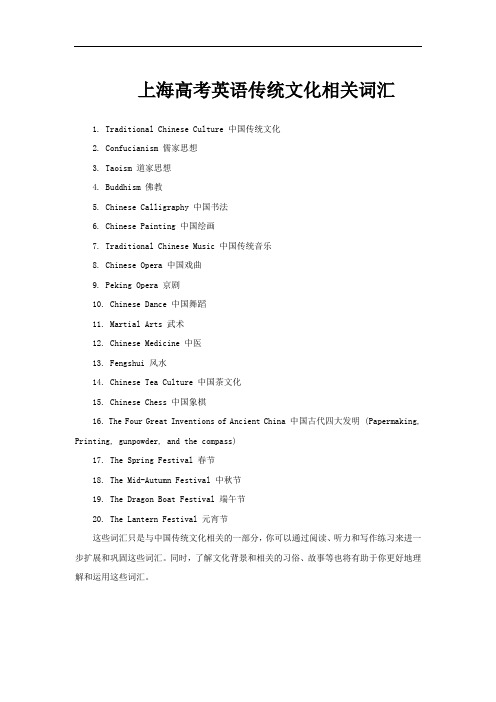上海高考英语作文之传统文化必备词汇
高考英语中国传统文化词汇

以下是一些高考英语中可能考察的中国传统文化词汇:
1. 春节(Spring Festival)
2. 丝绸之路(Silk Road)
3. 龙舟节(Dragon Boat Festival)
4. 中秋节(Mid-Autumn Festival)
5. 儒家思想(Confucianism)
6. 道家思想(Taoism)
7. 佛教(Buddhism)
8. 古琴(Guqin)
9. 京剧(Peking Opera)
10. 四大发明(Four Great Inventions of Ancient China)
11. 中国茶文化(Chinese tea culture)
12. 粤菜(Cantonese cuisine)
13. 传统汉服(Traditional Han Chinese clothing)
14. 中国古代建筑(Ancient Chinese architecture)
15. 书法(Calligraphy)
16. 饺子(Dumplings)
17. 高山流水(High Mountains and Flowing Waters)
18. 少林功夫(Shaolin Kung Fu)
19. 碟子(Chinese zither)
20. 京剧脸谱(Peking Opera facial makeup)
这些词汇涵盖了中国传统文化的不同方面,备考时可以通过阅读相关材料、观看相关纪录片或参加相关文化活动来进一步了解和复习。
高中英语——中国传统文化词汇和相关作文

中国传统文化词汇和作文一、词汇:中国主要传统节日Traditional Chinese Festivals:1. 春节(农历一月一日)the Spring Festival2. 除夕(农历十二月三十日) the New Year's Eve3. 中秋节(农历八月十五) the Mid-AutumnFestival4. 元宵节(农历一月十五日)the Lantern Festival5. 端午节(农历五月初五)the Dragon Boat Festival6. 清明节(4月5日) the Qingming Festival; theTomb-Sweeping Day7. 重阳节(农历九月九日) the Double NinthFestival8. 元旦(1月1日) New Year's Day新年习俗New Year customs:过年celebrate the Spring Festival拜年pay a New Year visit ; give New Year's greetings; pay a New Year's call 看春节联欢晚会watch the CCTV New Year's Gala贴春联put up/ paste Spring Festival couplets; put up New Year scrolls串亲戚pay a New Year visit to relatives and friends逛庙会go to the temple fair看花灯watch flower lanterns放鞭炮set off firecrackers; let off firecrackers放烟花set off fireworks春联the Spring Festival couplets中国主要传统文化Traditional Chinese culture:剪纸papercut/paper-cut中国结Chinese knot风筝kite脸谱facial mask京剧Beijing Opera/Peking Opera汉字Chinese character筷子chopsticks中国功夫Kung fu中国传统戏曲Chinese traditional opera传统中国建筑traditional Chinese architecture纪念品souvenir北京著名景点Places of interest in Beijing:南锣鼓巷NanluoguxiangHutong;Nanluoguxiang帽儿胡同MaoerHutong故宫the Forbidden City/the Palace Museum/the ImperialPalace颐和园the Summer Palace圆明园the Yuanmingyuan Park长城the Great Wall天安门广场Tian’anmen Square天坛the Temple of Heaven鸟巢the Bird Nest水立方the Water Cube香山the Fragrant Hill国家博物馆the National Museum of China首都博物馆the Capital Museum王府井大街Wangfujing Street老舍茶馆Laoshe Teahouse北京小吃Beijing snacks:饺子jiaozi; dumplings包子steamed stuffed buns面条noodles炸酱面Beijing fried sauce noodles;Beijing noodles with fried bean and meat sauce年糕rice cake; new year cake;Niangao火锅hot pot北京烤鸭Beijing Roast Duck二、中国传统文化作文范文:1.要求:某中学生英文报就“保护中国传统文化”为主题举行英语征文活动。
传统文化英语语料词汇

传统文化英语语料词汇
1. Traditional Culture: 传统文化
2. Cultural Heritage: 文化遗产
3. Ancestral Wisdom: 祖先智慧
4. Folk Customs: 民俗风情
5. Traditional Arts and Crafts: 传统手工艺
6. Ancient Literature: 古代文学
7. Classical Music: 古典音乐
8. Traditional Dance: 传统舞蹈
9. Martial Arts: 武术
10. Calligraphy and Painting: 书画艺术
11. Traditional Architecture: 传统建筑
12. Festivals and Ceremonies: 节日庆典
13. Cultural Identity: 文化认同
14. Ethnic Traditions: 民族传统
15. Oral Traditions: 口头传统
16. Cultural Continuity: 文化传承
17. Historical Sites: 历史遗迹
18. Intangible Cultural Heritage: 非物质文化遗产
19. Cultural Conservation: 文化保护
20. Traditional Values: 传统价值观
这些词汇可以用于描述和讨论各种传统文化元素,包括艺术、音乐、文学、哲学、风俗习惯等。
它们有助于理解和传承不同文化背景下的传统。
高考英语传统文化实用写作表达积累(词汇篇 4)

高考英语传统文化实用写作表达积累(词汇篇4)【节日】1. the Spring Festival 春节2. the Lantern Festival 元宵节3. the Tomb-sweeping Day 清明节4. the Dragon Boat Festival 端午节5. the Moon Festival/the Mid-Autumn Day 中秋节6. the Double Ninth Day/the Aged Day 重阳节【节气】1. the twenty-four solar terms 二十四节气2. Beginning of Spring 立春3. Rain Water 雨水4. Awakening of Insects 惊蛰5. Spring Equinox 春分6. Pure Brightness 清明7. Grain Rain 谷雨8. Beginning of Summer 立夏9. Grain Buds 小满10. Grain in Ear 芒种11. Summer Solstice 夏至12. Minor Heat 小暑13. Major Heat 大暑14. Beginning of Autumn 立秋15. End of Heat 处暑16. White Dew 白露17. Autumn Equinox 秋分18. Cold Dew 寒露19. Frost’s Descent 霜降20. Beginning of Winter 立冬21. Minor Snow 小雪22. Major Snow 大雪23. Winter Solstice 冬至24. Minor Cold 小寒25. Major Cold 大寒。
写中国传统文化的英语作文必背的词汇和句子

写中国传统文化的英语作文必背的词汇和句子Traditional Chinese culture has a long history and rich heritage that encompasses various aspects of life such as philosophy, art, music, cuisine, and literature. Understanding and appreciating these cultural elements can provide valuable insights into the values, beliefs, and traditions of the Chinese people.Here are some essential vocabulary and sentences that you should remember when writing about Chinese traditional culture:1. Confucianism: A philosophy founded by Confucius that emphasizes moral values, filial piety, and societal harmony.2. Daoism (Taoism): A philosophical and religious tradition that promotes harmony with nature, simplicity, and the balance of yin and yang.3. Buddhism: A religion that originated in India and was later introduced to China, emphasizing meditation, compassion, and the pursuit of enlightenment.4. Calligraphy: The art of writing Chinese characters with a brush and ink, often considered a form of self-expression and a reflection of one's personality.5. Tea ceremony: A traditional Chinese ritual that involves the preparation and serving of tea, symbolizing hospitality, respect, and tranquility.6. Traditional Chinese medicine: A system of healing that includes practices such as acupuncture, herbal remedies, and qigong, based on the concept of balancing the body's energy.7. Silk Road: An ancient trade route that connected China to the Middle East and Europe, facilitating cultural exchange and the spread of goods, ideas, and technologies.8. Four Great Inventions: Refers to the significant technological innovations of ancient China, including papermaking, printing, gunpowder, and the compass.9. Lantern Festival: A traditional Chinese celebration held on the fifteenth day of the Lunar New Year, featuring lantern displays, dragon dances, and the release of lanterns into the sky.10. "Harmony in diversity": A Confucian ideal that emphasizes the importance of unity, cooperation, and mutual respect among individuals and social groups.Sample Sentences:- Confucian ethics play a significant role in shaping Chinese societal values and behavior.- The art of Chinese calligraphy requires precision, discipline, and creativity.- Traditional Chinese cuisine is known for its use of fresh ingredients, subtle flavors, and balanced nutritional principles.- The practice of Tai Chi is a form of martial arts that promotes physical, mental, and spiritual well-being.- Chinese traditional music often features traditional instruments such as the guqin, pipa, and erhu.In conclusion, Chinese traditional culture is a treasure trove of wisdom, beauty, and traditions that have been passed down through generations. By exploring and understanding these cultural elements, we can gain a deeper appreciation of Chinese history, philosophy, and values. Learning about traditional Chinese culture is not only a means of preserving our heritage but also a way of fostering cross-cultural understanding and appreciation in today's globalized world.。
高考英语书面表达与传统文化

高考英语书面表达与传统文化高考书面表达融入优秀中华传统文化元素,因此如想提高高考成绩,你还应该熟悉以下内容。
一、熟记68个重要词汇传统文化1.春节:the Spring Festival2.元宵节:the Lantern Festival3.重阳节:the Double-Ninth Festival/the Chongyang Festival4.清明节:Tomb Sweeping Day/the Qingming Festival5.中秋节:the Mid-Autumn Festival6.除夕:Chinese New Year's Eve/Eve of the Spring Festival7.端午节:the Dragon Boat Festival/the Duanwu Festival8.国庆节:National Day9.泼水节:Water-Splashing Day优秀的文化1.丝绸之路:the Silk Road2.刺绣:embroidery3.剪纸:paper-cutting4.风筝:kite5.书法:calligraphy6.对联:(the Spring Festival) couplets7.儒家文化:Confucian culture8.中国结:Chinese knot9. 二十四节气:the 24 Solar Terms10.农历:lunar calendar11.文房四宝(笔墨纸砚): The Four Treasures of the Study (Brush, Ink stick, Paper, and Inkstone) 12.针灸:acupuncture13.中药:Chinese traditional medicine14.拔罐:cupping therapy15.象形文字:pictograms/pictographic Characters16.唐三彩:Tri-color Pottery of the Tang Dynasty/the Tang Tri-colored pottery17.孟子:Mencius18.火药:gunpowder19.指南针:Compass20.甲骨文:Oracle Bone Inscriptions21.旗袍:Cheongsam22. 中庸:The Way of Medium23.云锦:Nanjing brocade24.年画:New Year painting饮食文化1.饺子:dumpling/jiaozi2.元宵:tangyuan/sweet rice dumpling3.火锅:hot pot4.春卷:spring roll(s)5.盐水鸭:salted duck6.北京烤鸭:Beijing roast duck7.馄饨:wonton8.八宝饭:eight-treasure rice pudding文学与艺术1.《诗经》:Book of Poetry2.《史记》:Historical Records/Records of the Grand Historian 3.《红楼梦》:A Dream in Red Mansi on s4.《西游记》:Journey to the West5.京剧:Beijing Opera/Peking Opera6.黄梅戏:Huangmei Opera7.秦腔:Qin Opera8.昆曲:Kunqu Opera9.越剧:Yue Opera10.相声:Cross-talk11.太极拳:Tai Chi12.武术:Wushu/Chinese Martial Arts13.谜语:riddle14.古筝:Chinese Zither15.二胡:urheen16.《本草纲目》:Compendium of Materia Medica17.红双喜:double happiness18.宣纸:rice paper文化底蕴深厚的景点1.故宫博物院:The Palace Museum2.天坛:Altar of Heaven in Beijing3.长城:the Great Wall4.敦煌莫高窟:Mogao Caves5.兵马俑:Cotta Warriors/Terracotta Army6.夫子庙:the Confucian Temple7.中山陵:the Sun Yat-sen Mausoleum8.秦淮河:Qinhuai River9.四合院:siheyuan/quadrangle10.江南:South Regions of the Yangtze River二、了解6种中国文化瑰宝1.Chinese Knot (中国结)Chinese knot is a decorative handicraft art that began as a form of Chinese folk art, symbolizing good luck and prosperity. One major characteristic of Chinese knots is that all the knots are tied using one thread. They can come in a variety of colours such as gold, green, blue or black, though the most commonly used colour is red. There are many different shapes of Chinese knots, such as butterflies, flowers, birds, fish and so on.中国结是一种装饰性的手工艺品,是一种中国民间艺术形式,象征着好运和繁荣。
上海高考英语传统文化相关词汇

上海高考英语传统文化相关词汇
1. Traditional Chinese Culture 中国传统文化
2. Confucianism 儒家思想
3. Taoism 道家思想
4. Buddhism 佛教
5. Chinese Calligraphy 中国书法
6. Chinese Painting 中国绘画
7. Traditional Chinese Music 中国传统音乐
8. Chinese Opera 中国戏曲
9. Peking Opera 京剧
10. Chinese Dance 中国舞蹈
11. Martial Arts 武术
12. Chinese Medicine 中医
13. Fengshui 风水
14. Chinese Tea Culture 中国茶文化
15. Chinese Chess 中国象棋
16. The Four Great Inventions of Ancient China 中国古代四大发明 (Papermaking, Printing, gunpowder, and the compass)
17. The Spring Festival 春节
18. The Mid-Autumn Festival 中秋节
19. The Dragon Boat Festival 端午节
20. The Lantern Festival 元宵节
这些词汇只是与中国传统文化相关的一部分,你可以通过阅读、听力和写作练习来进一步扩展和巩固这些词汇。
同时,了解文化背景和相关的习俗、故事等也将有助于你更好地理解和运用这些词汇。
上海高考英语传统文化必备词汇

上海高考英语传统文化必备词汇1. Chinese calligraphy 中国书法2. Chinese painting 中国画3. Traditional Chinese music 中国传统音乐4. Chinese opera 中国戏曲5. Martial arts 武术6. Chinese tea culture 中国茶文化7. Confucianism 儒家思想8. Taoism 道家思想9. Buddhism 佛教10. Chinese medicine 中医11. Chinese chess 中国象棋12. Chinese lantern 中国灯笼13. Papercutting 剪纸14. Chinese New Year 春节15. Mid-Autumn Festival 中秋节16. Dragon Boat Festival 端午节17. Qingming Festival 清明节18. Lantern Festival 元宵节19. Chinese wedding customs 中国婚礼习俗20. Chinese clothing 中国服装21. Chinese ceramics 中国陶瓷22. The Great Wall 长城23. Terracotta Army 兵马俑24. Forbidden City 故宫25. Summer Palace 颐和园26. Temple of Heaven 天坛这些词汇只是一部分,传统文化涵盖的范围非常广泛,你还可以根据具体的话题和文章内容进一步扩展词汇量。
同时,理解和运用这些词汇需要结合相关的文化背景知识,以确保准确表达和理解其含义。
- 1、下载文档前请自行甄别文档内容的完整性,平台不提供额外的编辑、内容补充、找答案等附加服务。
- 2、"仅部分预览"的文档,不可在线预览部分如存在完整性等问题,可反馈申请退款(可完整预览的文档不适用该条件!)。
- 3、如文档侵犯您的权益,请联系客服反馈,我们会尽快为您处理(人工客服工作时间:9:00-18:30)。
传统文化——必备词汇
1. Lantern Festival 元宵节
2. Embroidery 刺绣
3. Double-Ninth Festival 重阳节
4. Tomb Sweeping Day 清明节
5. paper cutting 剪纸
6. Siheyuan/Quadrangle 四合院
7. Warring States 战国
8. Kunqu Opera 昆曲
9. Flower Drum Song 花鼓戏
10. Confucian culture 儒家文化
11. Tang Poetry 唐诗
12. Tang Dynasty 唐朝
13. Mid-Autumn Festival 中秋节
14. Beijing Opera/Peking Opera 京剧
15. Beijing Roast Duck 北京烤鸭
16. Paper Cutting 剪纸
17. lunar calendar 农历
18. the Palace Museum 故宫博物院
19. traditional Chinese festivals 中国传统节日
20. protecting traditional Chinese culture 保护中国传统文化
传统文化——必备句子
1. There are lots of places of interest in Beijing.
2. There are many places of interest where you can experience the traditional Chinese culture in Beijing.
3. I'm glad to hear that you are interested in traditional Chinese festivals.
4. As one of the traditional Chinese festivals, it has been enjoying great popularity in our country
5. My favorite Chinese festival is the Spring Festival which comes on the first day of the Chinese Lunar Year.
6. In a word, it is high time for us to treasure and develop our own valuable culture.
7. In China, these knots stand for friendship, love and good luck.
8. In my opinion, some measures should be taken to protect traditional culture effectively.
一篇好的书面表达,不仅要有亮眼的词汇,语法正确的句子,还要条理清晰地阐述自己的观点,并做到有理有据。
下面我们就结合考题来看一看有关传统文化写作的题目和范文。
传统文化——写作题目与范文
(一)
某中学生英文报就“保护中国传统文化”为主题举行英语征文活动。
你准备给该报投稿,稿件内容包括:
1. 保护中国传统文化的重要性
2. 列举1-2个你所知道的国家或当地政府文化保护的事例;
3. 谈谈你对文化保护的建议。
注意:
1. 字数:120词。
2. 可以适当增加细节,以使行文连贯。
范文:
Protecting Traditional Chinese Culture
Protecting traditional Chinese culture is of great importance to China's cultural diversity, economic prosperity, and social development. The government in Guangdong province has made it their mission to protect Chaoju (潮剧), a local form of dramatic theatre that began in Chaozhou in eastern Guangdong.
In my opinion, specific measures should be taken to protect traditional Chinese culture. To start with, we should make appropriate laws for everyone to follow. Also, we should educate people about the need to protect traditional culture. The more the public knows about it, the more support we can get.
It's time that we start treasuring our own valuable culture.
(二)
假定你是李华,想邀请外教Henry一起参观中国剪纸(paper-cutting) 艺术展。
请给他写封邮件,内容包括:
1. 展览时间、地点;
2. 展览内容。
注意:
1. 词数100左右;
2. 可以适当增加细节,以使行文连贯。
范文:
Dear Mr. Henry,
I'm Li Hua, a Chinese student of yours. I'm writing to invite you to join me in visiting a paper-cutting exhibition, where you can have a close look at traditional Chinese culture as you always wish.
The exhibition will be held from 9:00 a.m. to 5:00 p.m. next Friday in Renmin Park, which is just two blocks away from our school. We can get there by taking Bus Line 101 or Subway Line 2.
As is advertised, there will be all sorts of paper-cutting unique to China on exhibition, and whoever present will be given a work of a paper-cutting as a gift. For someone so fond ofChinese culture like you, it is absolutely a great opportunity you can't miss.
Looking forward to your early reply.
Yours,
Li Hua
(三)
假定你是李华,正在教你的英国朋友Leslie学习汉语。
请你写封邮件告知下次上课的计划。
内容包括:
1. 时间和地点;
2. 内容:学习唐诗;
3. 课前准备:简要了解唐朝的历史。
注意:
1. 词数100左右;
2. 可以适当增加细节,以使行文连贯。
范文:
Dear Leslie,
How are you? I'm writing to tell you about your next Chinese lesson.
We'll still meet at my school, but not on Saturday as usual, since I'll have to participate in a sporting activity that day. So let's make it three o'clock on Sunday afternoon.
As you know, in order to acquire a good knowledge of Chinese, you should learn more about Chinese culture and history. Therefore, this time I will introduce Tang Poetry to you, which is of great help in learning Chinese. I advise you to learn about the brief history of the Tang dynasty in advance. It will surely help you learn the poems.
Looking forward to hearing from you soon.
Yours,
Li Hua。
